Happy with her latest move, Indrani departed from Courtroom 51 with a spring in her step.
The woman who hopped up into the jail truck was a cheerful one.
Vaihayasi Pande Daniel reports from the Sheena Bora murder case.
Illustration: Dominic Xavier/Rediff.com
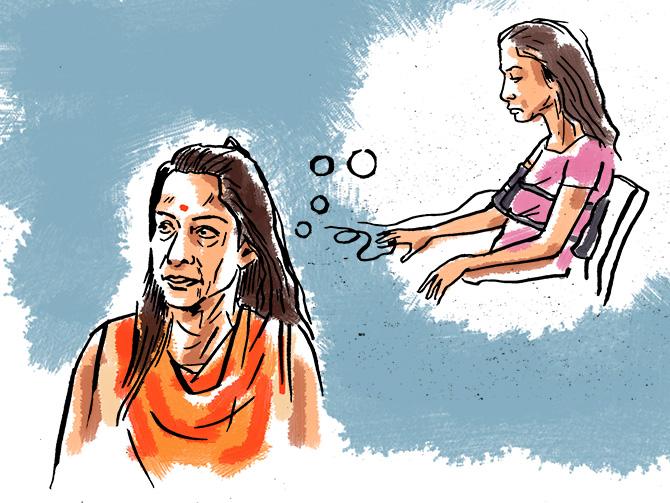
Wednesday, February 13, 2019, Indrani Mukerjea's sex was called into doubt in Courtroom 51 at the Mumbai city civil and sessions court in the Sheena Bora murder case.
Was she a female or a male?
Mrs Indrani Mukerjea? Mr Indrani Mukerjea? That would have been disconcerting for Peter.
Evidence was there for all to see -- she was looking becomingly feminine Wednesday in a pale melon-coloured sleeveless Lucknowi chikan kurta, matched with a carrot-coloured Fabindia chunni, red sparkling bangles, an orange bindi and brown jootis. But evidence, my dear reader, one has learned, is a very slippery commodity.
So why this confusion over her identity?
Is that a first?
Mukesh Gupta testified on behalf of Jet Airways for the prosecution as their Witness No 34. A prim, polite, particular man, belonging to the airlines's revenue and accounts department, Gupta looked very much like an accountant from afar; soberly dressed in a blue-grey-and-white graph shirt, black pants, black belt, black shoes and black glasses (nothing was in the red).
He spoke gently, and like a finance fellow too, in a modulated voice, answering carefully, systematically, his thinking processes probably in orderly Excel sheets too.
CBI Special Prosecutor Kavita Patil, in another of her starched white and black Bengali saris, capably and briskly took Gupta through his paces. He had been working for Jet Airways since 1993 and was in 2015, when he came in contact with this case, an assistant manager, revenue and accounts.
Khar police station, north west Mumbai, who did the initial investigation work in the Sheena Bora murder case, sent a request to the office of the airport manager at Mumbai, he said, asking for the details of certain passengers and flights in 2015.
From the airport manager's office the letter/request was directed to Gupta's accounts department. Gupta located the details from the information repository on the main server in 2015 and had it sent down to the office of Morgan D'Souza, the then airport manager. A letter, signed by D'Souza, was sent to the Khar police station, with the facts in it.
Patil helped Gupta put these pieces of information together as cogent testimony on Wednesday.
The notice from the Khar police station directed Jet to produce certain travel documents.
Patil: "Of? Names?"
Gupta: "Sanjeev Kushal Khanna. Shrimati Indrani Mukerjea."
The accountant located the ticket copies and the passenger manifesto for both passengers, he told Patil.
Patil checked if he could identify the document in which this information was contained.
Through a Q and A, between the prosecutor and him, Gupta explained that the information he had sourced in 2015 showed that there had been one ticket of Mr Sanjeev Khanna on Jet Airways Flt 9W2154 from Kolkata to Mumbai on April 24, 2012. And a second ticket on Jet Airways Flt 9W2151 from Mumbai to Kolkata on April 25, 2012.
Patil: "The third ticket?"
The court waited agog for Gupta's quiet reply. The third ticket would help establish the details of the alleged conspiracy between Indrani and Sanjeev that the CBI had outlined.
Gupta: "Miss Indrani Mukerjea."
CBI Special Judge Jayendra Chandrasen Jagdale confounded: "Miss?"
Twice-married "Miss Mukerjea" had travelled by Jet Airways Flt 9W2151 from Mumbai to Kolkata on April 25, 2012.
Patil enquired about the passenger manifesto.
Gupta said they were of the April 24, 2012 flight of 9W2154 and the April 25, 2012 flight 9W2151.
Patil instructed: "Tell the court about seat numbers of both the passengers. First Mumbai to Kolkata."
Gupta: "Mumbai to Kolkata Seat 17C for Mr Khanna... And for 'Miss' Indrani Mukerjea..."
More collective bated breath in the courtroom. Would Indrani have been sitting next to Sanjeev? Or maybe relaxing luxuriously in business class, with six costly inches more for her short legs?
Gupta announced: "Seat No 17B."
On his journey into Mumbai from Kolkata Sanjeev had travelled in Seat 13C. Sanjeev obviously prefers aisle seats and not looking out of plane windows.
Patil serenely pushed the point home a little more, for effect: "These seats 17B and 17C are adjacent to each other?"
Gupta: "Yes."
He additionally re-confirmed that the manifestos were for that "particular day" and that "particular flight."
The tickets for the April 25 flight of Sanjeev and Indrani had been booked the day before on April 24. That was in direct conflict with the information of another prosecution witness Julian Paul of Tuesday, whose chart of flights booked by his travel agency showed the flight of April 25 had been booked on April 21.
It was Indrani's lawyer Gunjan Mangla, in a gold-badla-speckled black kurta and white churidar, who handled Gupta's cross-examination on Wednesday. She did it in a decisive, swift, manner. You could easily follow the trajectory of her thought, as she ticked off box by box.
The punchline (no pun intended) was, of course, a surprise... wait for it.
She, like an advocate picking up a textbook case, while conducting a law class for greenhorn students on how to analyse and demolish a damning piece of evidence to put it in perspective, methodically first verified how Gupta knew that the letter between D'Souza and the Khar police station had been signed by D'Souza -- had Gupta actually seen the airport manager sign it?
He had not.
Had Gupta himself delivered the letter to the Khar police station. He had not.
Did he have any knowledge of how the letter was delivered to the Khar police station? He did not.
Had the actual letter been prepared by Gupta. He had not.
Did he have exact details of how the request for information came to him? Who had sent it? He did not.
Finally, Mangla, in a slick, clean, manner, stuck her long lawyer knife in and artfully twisted it: "Now Mr Gupta, the list of passengers given does it have the sex? M for male and F for female?"
Gupta agreed. But he was very alert now, his hands clasped together in front of him.
Mangla: "Kindly turn to page 6 (of the submission) where you said 17B was the passenger. Is it correct that the sex denoted (there) is M?"
Gupta ruefully: "Yes." He smiled.
Mangla, needlessly but effectively: "(So the passenger) must be a male?"
At the back in the accused enclosure 'Mr Indrani' was gleeful. A big smile was frolicking across her face, delighted, perhaps for once in her life, to be discovered a man.
Sanjeev 'Kushal' Khanna was also following the exchanges intently.
Someone from the benches suggested: "Exchange kiya?"
Judge Jagdale confused, but intrigued, was at loss for words. He turned to Mangla: "How are you challenging... what are you examining?"
Mangla simply said she was showing that the passenger travelling was a male and she was not opening up any further line of questioning/thought etc.
Lastly, she had two more queries for Gupta: Who had issued the ticket to Sanjeev and Indrani? And where had he sourced the presented information from -- from his own computer at Jet Airways or from the main server?
Mystic Travels had issued the ticket on April 24 for the 25th, Gupta read out slowly, perceptibly unfamiliar with the name. The accountant said the information had been accessed from the main server.
The lawyer, while closing the 'cross', declared that the letter from Jet to the Khar police station was "false and incorrect."
Mangla, through her cross-examination, had neatly dropped a telling trail of breadcrumbs, that twisted and turned wildly, that could lead one's reasoning in any direction. Had a request been received by Jet Airways from the Khar police station at all? Or had it worked the other way?
The information had been first elicited and then the paperwork put in its place?
How did the passenger in Seat 17B turn out to be a man if he was Indrani?
Or was the Indrani Mukerjea who travelled to Kolkata on April 25, 2012 a man?
Gupta would have surely had a thoughtful ride home to his flat in Bhayandar West, the township north of Mumbai.
Next, the long-awaited Prosecution Witness 35 was called to the stand: Mr Sameer Buddha.
Once an employee of INX Media, he is the director of marketing at Star Protection Private Limited and the brother of Suhail Buddha, a former Mumbai policeman, who once worked at Star India.
Mr Buddha, 41, who has had a bearing on this trial from the start, his name popping up at the strangest of moments, turned out to be a trim, balding man of medium height, sporting a close-cut moustache.
On first sight he did not come across as a very flamboyant type but an individual with a quiet presence, who if you passed on the street you might not pause to give a second glance.
Dressed in non-descript grey and black, he wore frameless glasses and a silver watch. His cell phone was in his left pocket. He stood in the stand with his hands behind his back and spoke in a clipped, impersonal but polished manner.
He told the court he had both a BSc (Mithibai College, Juhu Vile Parle, north west Mumbai) and an MBA (from the Narsee Monji Institute of Management Studies, Juhu Vile Parle, north west Mumbai).
The judge, looking up from his papers, wondered: "Suhail Buddha?"
Mangla pertly: "That's his brother, my lord."
His testimony, conducted by Patil was short. She enquired of Buddha if he knew Indrani Mukerjea and then if he knew the Mukerjeas's erstwhile driver and Accused No 3 Shyamvar Pinturam Rai.
Buddha stated he had worked for Indrani Mukerjea first at INX Services (from 2005) and then at INX Media (from 2007), for four years in all.
Buddha: "I know Shyamvar Rai as a driver. After I left INX Media in 2009 I met Shyamvar Rai in the year 2012. Indrani sent him for employment in my company, I had started my own company. Yes, she had called."
Obliging Indrani, Buddha offered Rai a job. "But he was expecting a much higher salary so I could not hire him. After a year in 2013 he came back to me and he was willing to work at my given salary. He didn't join as a full-time employee because he was not regular. I used to pay him as and when he used to come."
Buddha said the driver worked for him (or his company) till a little before Rai's arrest in August 2015, adding crucially, "He had gone on leave before that."
Patil determined if Buddha knew Sheena Bora. It seemed he had known her just peripherally -- as Indrani's "younger sister" -- having run into her at the INX Services office once or twice.
They had occasion to speak too, once on the phone in 2012 when Indrani put Sheena onto him. Sheena was in the market to buy a new laptop and needed Buddha's advice. He subsequently sms-ed the configuration of the laptop he suggested she purchase.
Buddha was asked to identify Indrani. He simply said, in a cool manner, that she was indeed in the room. He never looked towards her and they didn't exchange a glance. Some variety of iciness seemed palpable,
The cross examination of Buddha had to wait for another date when Indrani's lawyer Sudeep Ratnamberdutt Pasbola was available, as had been scheduled earlier.
The judge was still confused between the two Buddhas and perplexed about what needed to be asked of Buddha by the defence. "There is another Buddha?"
Mangla announced: "There are two Buddhas", and she said the defence had a lot to ask Sameer Buddha, as he looked on impassively, face blank, choosing to remain on the periphery, as if they were discussing some other Sameer Buddha, who was perhaps not in the room.
Mangla requested if she might ask Buddha just one question.
The judge assented.
Mangla: "Mr Buddha, do you possess a police uniform?"
Buddha first said he did and then corrected himself saying it was a home guard uniform and he left the Maharashtra Home Guards in March last year.
As soon as the hearing was over, Indrani came to the front of the courtroom. She was clutching some papers. A very expectant expression was playing on her face, her excitement was barely concealed, it bubbled below the surface. She said she had an announcement to make.
Her handwritten application -- she has an immaculate feminine hand (Take that Jet Airways) -- was then submitted to the judge by her lawyers and a copy provided to the prosecution.
It read: 'During the process of investigation the CBI had offered to conduct a lie detector test in 2015 October. It is correct to say that 2015 October, I had not given my consent to undertake the lie detector (polygraph) test.'
'It is pertinent to mention here is that I had not given my consent at that point because I was under tremendous pressure not to undergo the test.'
'I had succumbed to such pressure at that stage because I was in a state of shock, mentally disturbed and vulnerable and physically very unwell.'
'However, now I am emotionally more settled and I realise that I should have never succumbed to such pressure.'
'It is only right and proper in the name of justice that I undergo the polygraph test as out of the 200 witnesses, only 35 have deposed so far. The investigation is also still continuing...'
Indrani then 'most respectfully prayed' for permission to take the test. She also prayed for 'any other and further that this Hon'ble Court may deem fit and proper in the name of justice.'.
Indrani ended it with, in capital letters: 'For this act of kindness I am in duty bound and shall forever prayer.' Signed Indrani Pratim Mukerjea, though her girlish signature contained Bora in it.
It is now up to the judge and prosecution to agree.
Given that Indrani had refused the test before they can cite that as reason to refuse her now, especially since the case has gone to trial. Or that polygraph test evidence is not counted or essential
A polygraph test functions by measuring heart beat rate, respiration, blood pressure etc. Does perhaps its efficacy grow less over time?
Happy with her latest move, Indrani departed from Courtroom 51 with a spring in her step.
The woman, who hopped up into the jail truck, a few minutes later, in the courtyard below, her orange chunni and hair swinging, with three cops bringing up the rear, was a cheerful one.
At that moment, that oft-repeated phrase came tripping into one's head: There but for the grace of God go I.
- MUST READ: The Sheena Bora Murder Trial
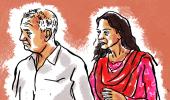


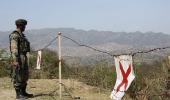




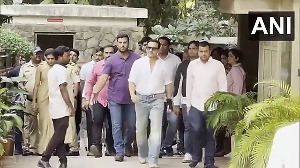
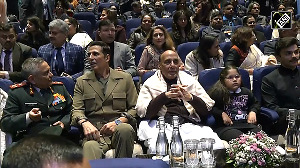
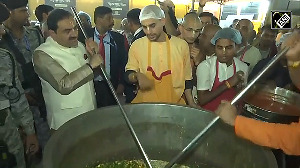
 © 2025
© 2025